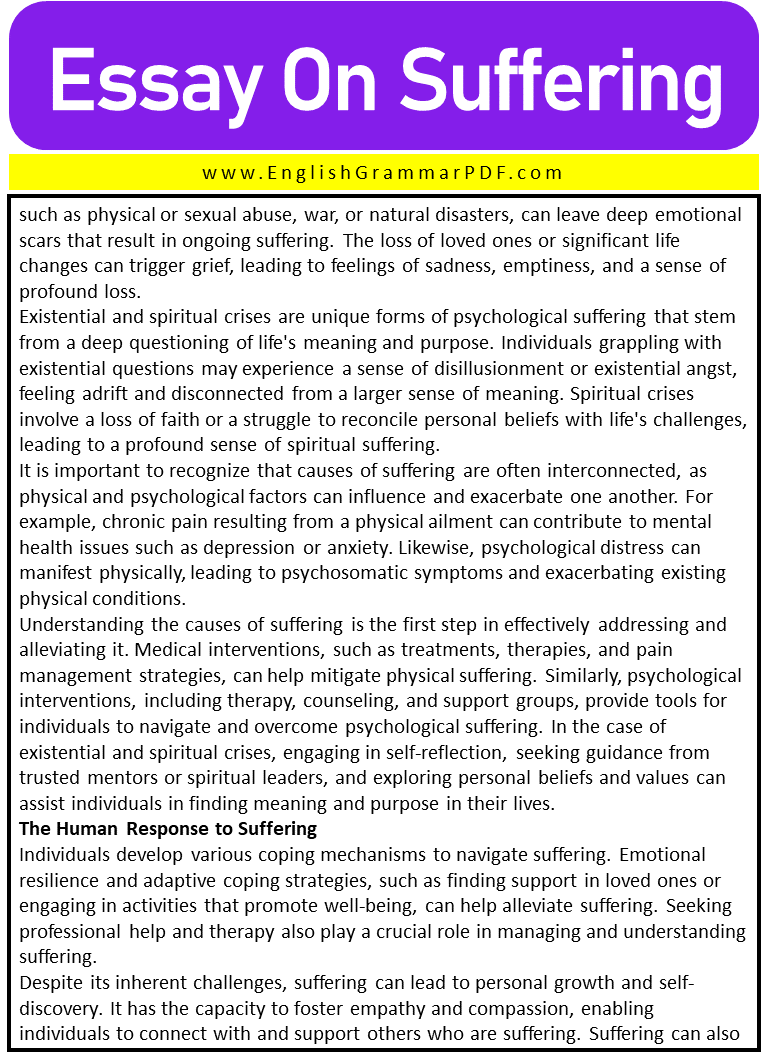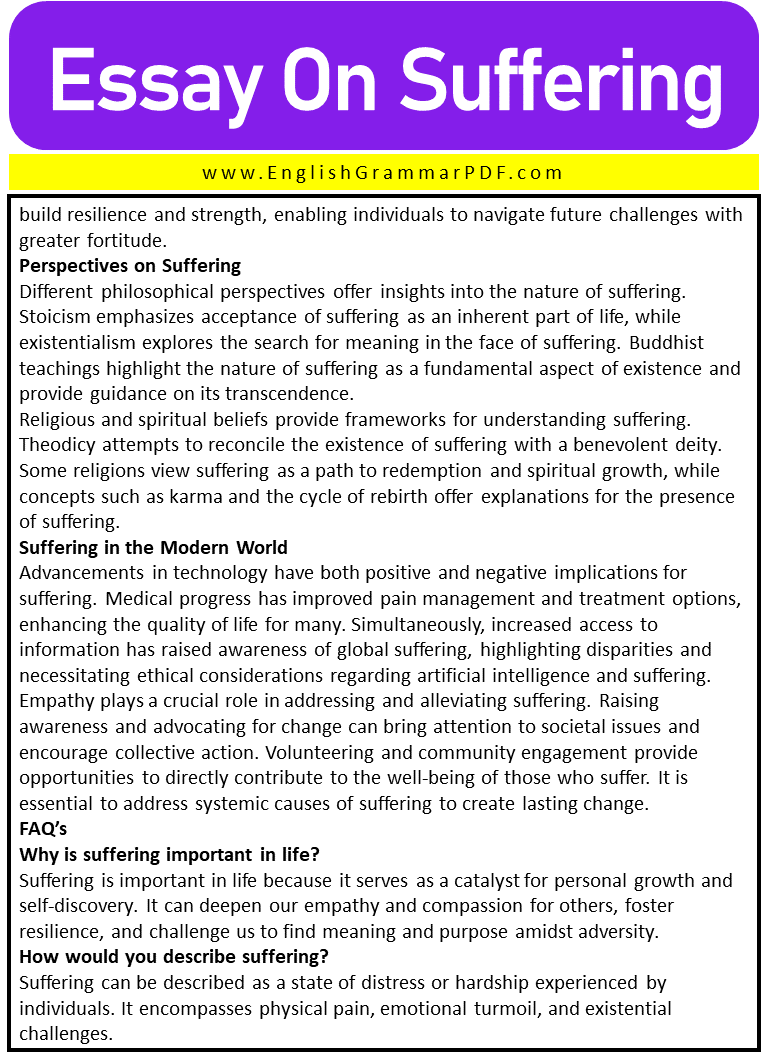Essay On Suffering
Outline of Essay:
- Introduction
- Causes of Suffering
- Individual suffering
- Collective suffering
- The Human Response to Suffering
- Perspectives on Suffering
- Suffering in the Modern World
Introduction
Suffering is a fundamental aspect of the human experience, encompassing a range of physical, psychological, and existential challenges. It is crucial to delve into the concept of suffering in order to gain a deeper understanding of ourselves and the world we inhabit. This essay explores the causes, manifestations, and potential effects of suffering, emphasizing its significance in our lives.
Causes of Suffering
Suffering is a complex phenomenon that encompasses a variety of causes and experiences. It can be classified into two broad categories: physical suffering and psychological suffering. Understanding the causes of suffering is crucial in order to effectively address and alleviate it.
Physical suffering is often associated with illness, disease, and injury. When individuals experience health-related challenges, they endure physical pain, discomfort, and limitations. Illnesses and diseases such as cancer, heart disease, and autoimmune disorders can cause immense suffering as individuals grapple with the physical toll on their bodies. Similarly, injuries resulting from accidents or trauma can lead to prolonged pain and suffering. Additionally, the process of aging and the inevitable approach of mortality can bring about physical suffering as individuals face the decline of their bodies and the accompanying health issues.
Psychological suffering, on the other hand, involves the emotional and cognitive aspects of an individual’s well-being. Mental health disorders, such as depression, anxiety, and bipolar disorder, can cause significant suffering as individuals struggle with their thoughts, emotions, and behaviors. These disorders often impair daily functioning, disrupt relationships, and diminish overall quality of life. Trauma and grief are also common causes of psychological suffering. Traumatic experiences, such as physical or sexual abuse, war, or natural disasters, can leave deep emotional scars that result in ongoing suffering. The loss of loved ones or significant life changes can trigger grief, leading to feelings of sadness, emptiness, and a sense of profound loss.
Existential and spiritual crises are unique forms of psychological suffering that stem from a deep questioning of life’s meaning and purpose. Individuals grappling with existential questions may experience a sense of disillusionment or existential angst, feeling adrift and disconnected from a larger sense of meaning. Spiritual crises involve a loss of faith or a struggle to reconcile personal beliefs with life’s challenges, leading to a profound sense of spiritual suffering.
It is important to recognize that causes of suffering are often interconnected, as physical and psychological factors can influence and exacerbate one another. For example, chronic pain resulting from a physical ailment can contribute to mental health issues such as depression or anxiety. Likewise, psychological distress can manifest physically, leading to psychosomatic symptoms and exacerbating existing physical conditions.
Understanding the causes of suffering is the first step in effectively addressing and alleviating it. Medical interventions, such as treatments, therapies, and pain management strategies, can help mitigate physical suffering. Similarly, psychological interventions, including therapy, counseling, and support groups, provide tools for individuals to navigate and overcome psychological suffering. In the case of existential and spiritual crises, engaging in self-reflection, seeking guidance from trusted mentors or spiritual leaders, and exploring personal beliefs and values can assist individuals in finding meaning and purpose in their lives.
The Human Response to Suffering
Individuals develop various coping mechanisms to navigate suffering. Emotional resilience and adaptive coping strategies, such as finding support in loved ones or engaging in activities that promote well-being, can help alleviate suffering. Seeking professional help and therapy also play a crucial role in managing and understanding suffering.
Despite its inherent challenges, suffering can lead to personal growth and self-discovery. It has the capacity to foster empathy and compassion, enabling individuals to connect with and support others who are suffering. Suffering can also build resilience and strength, enabling individuals to navigate future challenges with greater fortitude.
Perspectives on Suffering
Different philosophical perspectives offer insights into the nature of suffering. Stoicism emphasizes acceptance of suffering as an inherent part of life, while existentialism explores the search for meaning in the face of suffering. Buddhist teachings highlight the nature of suffering as a fundamental aspect of existence and provide guidance on its transcendence.
Religious and spiritual beliefs provide frameworks for understanding suffering. Theodicy attempts to reconcile the existence of suffering with a benevolent deity. Some religions view suffering as a path to redemption and spiritual growth, while concepts such as karma and the cycle of rebirth offer explanations for the presence of suffering.
Suffering in the Modern World
Advancements in technology have both positive and negative implications for suffering. Medical progress has improved pain management and treatment options, enhancing the quality of life for many. Simultaneously, increased access to information has raised awareness of global suffering, highlighting disparities and necessitating ethical considerations regarding artificial intelligence and suffering.
Empathy plays a crucial role in addressing and alleviating suffering. Raising awareness and advocating for change can bring attention to societal issues and encourage collective action. Volunteering and community engagement provide opportunities to directly contribute to the well-being of those who suffer. It is essential to address systemic causes of suffering to create lasting change.
FAQ’s
Why is suffering important in life?
Suffering is important in life because it serves as a catalyst for personal growth and self-discovery. It can deepen our empathy and compassion for others, foster resilience, and challenge us to find meaning and purpose amidst adversity.
How would you describe suffering?
Suffering can be described as a state of distress or hardship experienced by individuals. It encompasses physical pain, emotional turmoil, and existential challenges. Suffering is a universal human experience that can profoundly impact our lives and shape our understanding of ourselves and the world around us.
Explore More Essays:
Essay On The Value Of Generosity
Download the PDF of Essay






